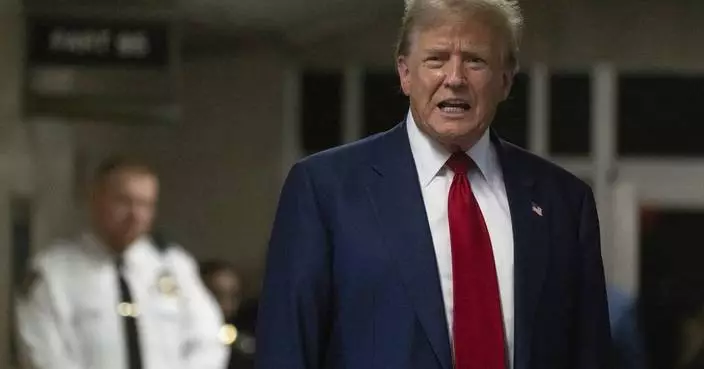Amid fresh uncertainty over his planned summit with North Korean leader Kim Jong Un, President Donald Trump said Wednesday that he is committed to pressing for the country to abandon its nuclear program as part of any meeting.
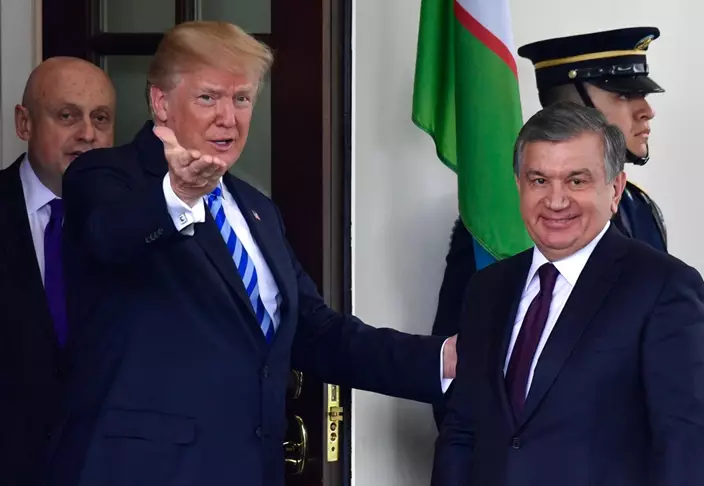
President Donald Trump greets Uzbek President Shavkat Mirziyoyev outside the West Wing of the White House in Washington, Wednesday, May 16, 2018. (AP Photo/Susan Walsh)
North Korea threatened earlier in the day to scrap the historic summit between Trump and Kim, saying it has no interest in a "one-sided" affair meant to pressure the North to abandon its nuclear weapons. But Trump appeared to shrug off the warning saying the U.S. hadn't been notified.
"We haven't seen anything, we haven't heard anything," Trump said as he welcomed the president of Uzbekistan to the White House. "We will see what happens."
The warning from North Korea's first vice foreign minister came after the country abruptly canceled a high-level meeting with South Korea to protest U.S.-South Korean military exercises that the North has long claimed are an invasion rehearsal.
Behind the scenes, White House aides tried to soothe South Korean frustrations over the canceled meeting with the North as they continue to plan for the summit, set for June 12 in Singapore, as if nothing had changed. U.S. officials compared the threat to Trump's own warning that he might walk away from the summit if he determines Kim is not serious about abandoning his nuclear program.
The direction from the Oval Office to White House aides and other U.S. national security agencies Wednesday was to downplay the North Korean threats and not "take the bait" by overreacting to the provocation, said a senior U.S. official. The official wasn't authorized to discuss internal conversation publicly and requested anonymity.
National Security Adviser John Bolton told Fox News Radio Wednesday that "we are trying to be both optimistic and realistic at the same time."
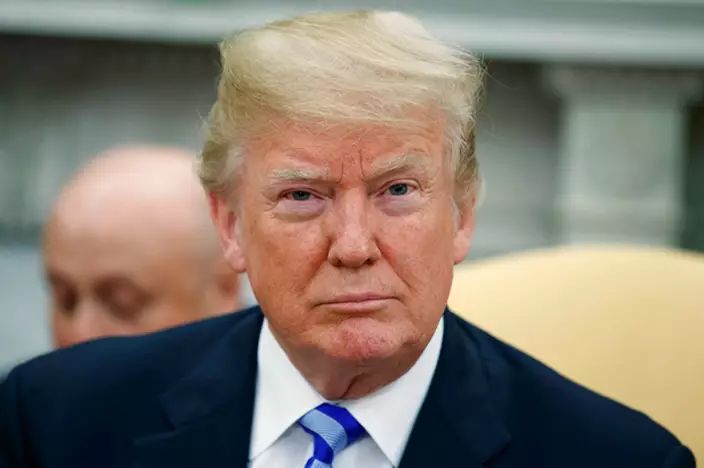
President Donald Trump listens during a meeting with Uzbek President Shavkat Mirziyoyev in the Oval Office of the White House, Wednesday, May 16, 2018, in Washington. (AP Photo/Evan Vucci)
Bolton, who was called out by name by the North for saying that the U.S. is seeking an outcome similar to Libya's unilateral nuclear disarmament, said the personal attack raised the question of "whether this really is a sign that that they're not taking our objective of denuclearization seriously."
North Korean first vice foreign minister Kim Kye Gwan said in a statement carried by state media that "we are no longer interested in a negotiation that will be all about driving us into a corner and making a one-sided demand for us to give up our nukes and this would force us to reconsider whether we would accept the North Korea-U.S. summit meeting."
In its commentaries published through the state-run news agency, North Korea steered clear of criticizing Trump himself and Secretary of State Mike Pompeo, who last week met with North Korean leader Kim Jong Un for the second time in little more than one month and brought home three American prisoners. That suggested it still wants the summit to go ahead.
But it also took the opportunity to air its own negotiating position and take aim at Bolton, who has suggested that negotiations in 2004 that led to the shipping of nuclear components to the U.S. from Libya under Moammar Gadhafi would be a good model for North Korea as well — although Gadhafi was deposed seven years later following a NATO-led military campaign. The North on Wednesday described that proposal as a "sinister move" to bring about its own collapse.
North Korea may have also been responding to aims for the summit aired by Bolton and Pompeo in Sunday morning talk shows last weekend.
Bolton told ABC that denuclearization means getting rid of all the North's nuclear weapons, dismantling them and taking them to Oakridge, Tennessee, where the U.S. developed its atomic bomb during World War II and retains a nuclear and high-technology research laboratory. Bolton added that North Korea would have to get rid of its uranium enrichment and plutonium reprocessing facilities, reveal their weapons sites and allow open inspections.
The toughest of North Korea's statements was issued in the name of Kim Kye Gwan, who was a leading negotiator of an aid-for-disarmament deal that collapsed under the G. W. Bush administration at a time when Bolton was serving as undersecretary of state for arms control and North Korea was suspected of secretly seeking to enrich uranium.
The State Department emphasized that North Korea's leader had previously indicated he understood the need and purpose of the U.S. continuing its long-planned exercises with South Korea. State Department spokeswoman Heather Nauert said the U.S. had not heard anything directly from North or South Korea that would change that.
"We will continue to go ahead and plan the meeting between President Trump and Kim Jong Un," Nauert said.
Press secretary Sarah Huckabee Sanders said earlier Wednesday that preparations for the summit were ongoing despite the cancellation threat and that Trump is hopeful the meeting will still take place.
"If it doesn't, we'll continue the maximum pressure campaign that's been ongoing," she told Fox & Friends.
Oregon Democratic Sen. Ron Wyden said he is concerned that talks are "really being oversimplified" by the White House.
"This is not a like condo deal where two people sit down and hash out a number of outstanding issues and then they say 'Well, some lawyers can write it up,'" he said.
WASHINGTON (AP) — Without wielding the gavel or holding a formal job laid out in the Constitution, Rep. Hakeem Jeffries might very well be the most powerful person in Congress right now.
The minority leader of the House Democrats, it was Jeffries who provided the votes needed to keep the government running despite opposition from House Republicans to prevent a federal shutdown.
Jeffries who made sure Democrats delivered the tally to send $95 billion foreign aid to Ukraine and other U.S. allies.
And Jeffries who, with the full force of House Democratic leadership behind him, decided this week his party would help Speaker Mike Johnson stay on the job rather than be ousted by far-right Republicans led by Rep. Marjorie Taylor Greene.
“How powerful is Jeffries right now?” said Jeffery Jenkins, a public policy professor at the University of Southern California who has written extensively about Congress. “That’s significant power.”
The decision by Jeffries and the House Democratic leadership team to lend their votes to stop Johnson's ouster provides a powerful inflection point in what has been a long political season of dysfunction, stalemate and chaos in Congress.
By declaring enough is enough, that it's time to “turn the page” on the Republican tumult, the Democratic leader is flexing his power in a very public and timely way, an attempt to show lawmakers, and anyone else watching in dismay at the broken Congress, that there can be an alternative approach to governing.
“From the very beginning of this Congress, House Republicans have visited chaos, dysfunction and extremism on the American people,” Jeffries said Wednesday at the Capitol.
Jeffries said that with House Republicans “unwilling or unable" to get "the extreme MAGA Republicans under control, “it’s going to take a bipartisan coalition and partnership to accomplish that objective. We need more common sense in Washington, D.C., and less chaos.”
In the House, the minority leader is often seen as the speaker-in-waiting, the highest-ranking official of the party that's out of power, biding their time in hopes of regaining the majority — and with it, the speaker's gavel — in the next election. Elected by their own party, it's a job without much formal underpinning.
But in Jeffries' case, the minority leader position has come with enormous power, filling the political void left by the actual speaker, Johnson, who commands a fragile, thread-thin Republican majority and is constantly under threat from far-right provocateurs that the GOP speaker cannot fully control.
“He’s operating as a shadow speaker on all the important votes,” said Rep. Pramila Jayapal, D-Wash., chair of the Congressional Progressive Caucus.
While Johnson still marshals the powerful tools of the speaker's office, a job outlined in the Constitution and second in the line of succession to the presidency, the Republican-led House has churned through a tumultuous session of infighting and upheaval that has left their goals and priorities stalled out.
In a fit of displeasure just months into their majority, far-right Republicans ousted the previous speaker, the now-retired Rep. Kevin McCarthy, R-Calif., last fall in a never-before-seen act of party revolt. He declined to specifically ask the Democrats for help.
Johnson faces the same threat of removal, but Jeffries sees in Johnson a more honest broker and potential partner he is willing to at least temporarily prop up — even though Johnson, too, has not overtly asked for any assist from across the aisle. A vote on Greene's motion to vacate the speaker is expected next week.
As Johnson sidles up to Donald Trump, receiving the presumed Republican presidential nominee's nod of support, it is Jeffries who holds what Democratic Rep. Nancy Pelosi, the speaker emerita, has referred to as “currency of the realm” — votes — that are required in the House to get any agenda over the finish line.
Pelosi said in an interview that Jeffries as the minority leader has “always had leverage” because of the slim House majority.
“But it’s a question of him showing that he’s willing to use it,” she said.
Jeffries has been “masterful,” she said, at securing Democratic priorities, notably humanitarian assistance in the foreign aid package that Republicans initially opposed.
But Pelosi disagreed with the idea that Democrats lending support to Johnson at this juncture creates some sort of new coalition era of U.S. politics.
"Our House functions because we’re willing to be bipartisan in making it function,” she said. “He’s not necessarily saving Speaker Johnson — he’s upholding the dignity of the institution."
Jeffries is a quietly confident operator, positioning himself, and his party, as purveyors of democratic norms amid the Republican thunderclap of Trump-era disruption.
The first Black American to lead a political party in Congress, Jeffries is already a historic figure, whose stature will only rise further if he is elected as the first to wield the gavel as House speaker.
Born in Brooklyn, Jeffries, 53, rose steadily through the ranks in New York state politics and then on the national stage, a charismatic next-generation leader, first elected to Congress in 2012 from the district parts of which were once represented by another historic lawmaker, Shirley Chisolm, the first Black woman elected to Congress.
A former corporate lawyer, Jeffries is also known for his sharp oratory, drawing on his upbringing in the historically Black Cornerstone Baptist Church, a spiritual home for many grandchildren and great-grandchildren of enslaved African Americans who fled to Brooklyn from the American South. But he also infuses his speeches and remarks with a modern sensibility and cadence, bridging generations.
Last year, when Republicans could not muster the votes on a procedural step for a budget and debt deal, it was Jeffries who stood intently at his desk in the House chamber, and lifted his voting card to signal to Democrats it was time to step up and deliver.
Repeatedly, Jeffries has ensured the Democratic votes to prevent a federal government shutdown. And last month, when Johnson faced an all-out hard-right Republican revolt over the Ukraine aid, Jeffries again stepped in, assuring Democrats had more votes than Republicans to see it to passage.
Ahead of the November election, the two parties are in a fight for political survival to control the narrowly divided House, and Jeffries would most certainly face his own challenges leading Democrats if they were to gain the majority, splintered over many key issues.
But Jeffries and Johnson have both been in a cross-country sprint, raising money and enthusiasm for their own party candidates ahead of November — the Republican speaker trying to keep his job, the Democratic leader waiting to take it on.

FILE - House Minority Leader Hakeem Jeffries of N.Y., left, and Vice President Kamala Harris listen as President Joe Biden speaks during a meeting with Democratic lawmakers in the Roosevelt Room of the White House, Jan. 24, 2023, in Washington. AP Photo/Evan Vucci, File)
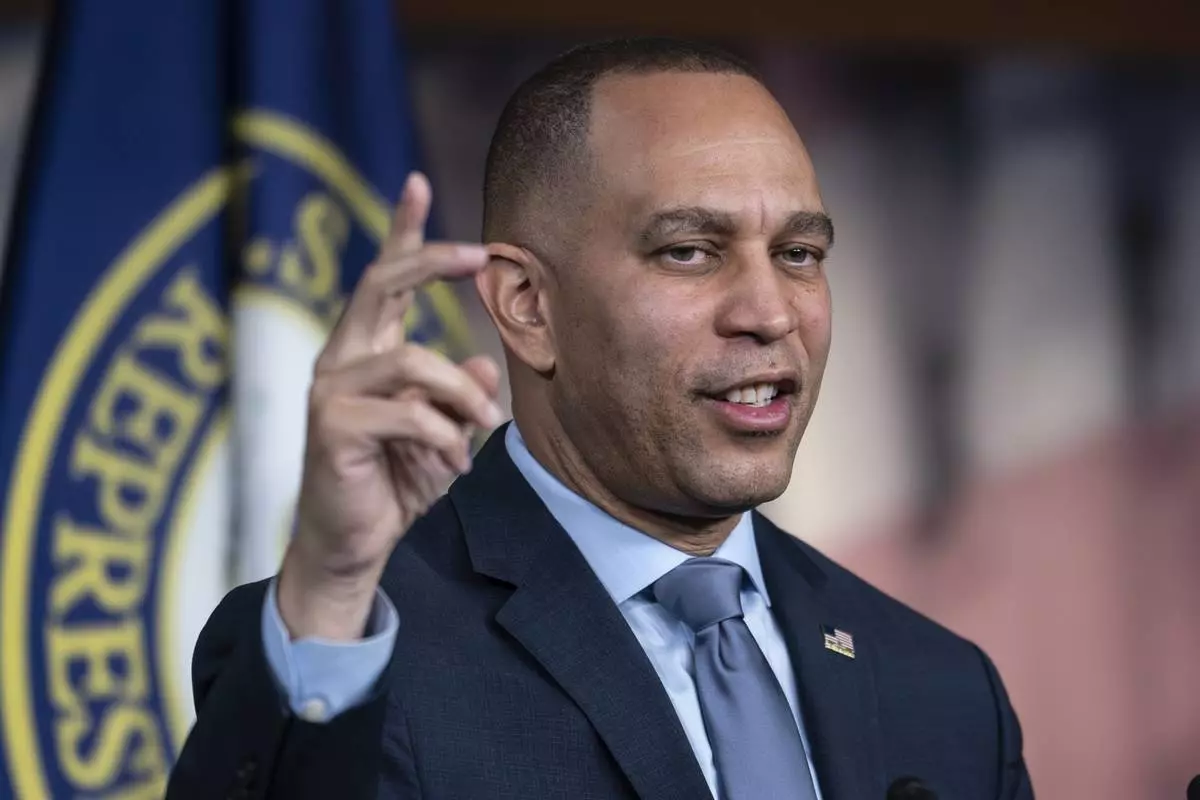
FILE - House Minority Leader Hakeem Jeffries, D-N.Y., speaks at a news conference at the Capitol in Washington, Dec. 7, 2023. (AP Photo/J. Scott Applewhite, File)

FILE - Rep. Hakeem Jeffries, D-N.Y., alongside other members of the Congressional Black Caucus, speaks in front of the Senate chambers about their support of voting rights legislation at the Capitol in Washington, Jan. 19, 2022. (AP Photo/Amanda Andrade-Rhoades, File)

FILE - Speaker of the House Mike Johnson of La., speaks as House Minority Leader Hakeem Jeffries of N.Y., listens at the March for Israel on Nov. 14, 2023, on the National Mall in Washington. (AP Photo/Mark Schiefelbein, File)
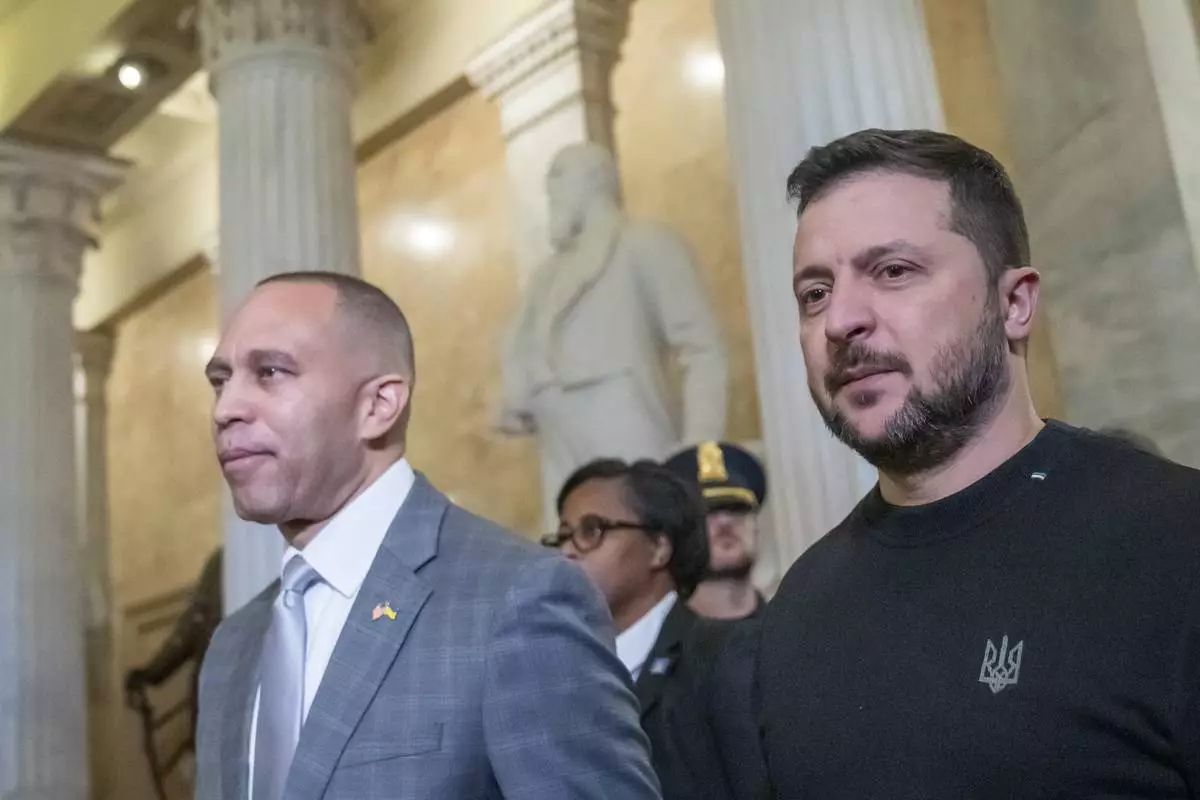
FILE - House Minority Leader Hakeem Jeffries of N.Y., left, walks with Ukrainian President Volodymyr Zelenskyy in the U.S. Capitol to a meeting with other congressional leaders, Dec. 12, 2023, in Washington. (AP Photo/Alex Brandon, File)

FILE - Democratic presidential candidatel Hillary Clinton, center, talks with Rep. Hakeem Jeffries, D-N.Y., right, and Council Member Laurie Cumbo as she sits at the counter of Junior's restaurant in the Brooklyn borough of New York, April 9, 2016. (AP Photo/Seth Wenig, File)

FILE - Incoming House Speaker Kevin McCarthy of Calif., receives the gavel from House Minority Leader Hakeem Jeffries of N.Y., on the House floor at the U.S. Capitol in Washington, early Saturday, Jan. 7, 2023. Republican McCarthy was elected House speaker on a historic post-midnight 15th ballot. (AP Photo/Andrew Harnik, File)
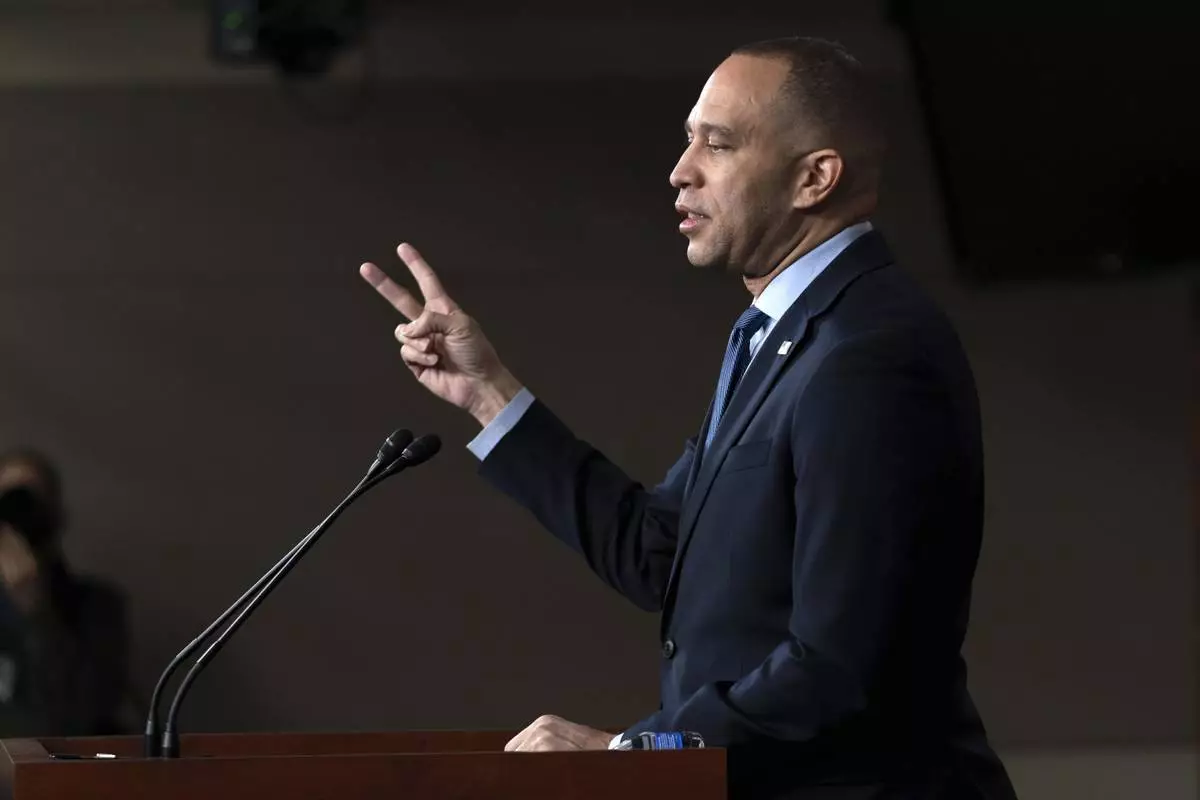
FILE - House Minority Leader Hakeem Jeffries of N.Y., speaks during a news conference at the Capitol in Washington, Feb. 7, 2024. (AP Photo/Jose Luis Magana, File)

FILE - House Minority Leader Hakeem Jeffries of N.Y., hands the gavel to speaker-elect Rep. Mike Johnson, R-La., at the Capitol in Washington, Oct. 25, 2023. (AP Photo/Alex Brandon, File)

FILE - Rep. Hakeem Jeffries, D-N.Y., speaks during a House Judiciary Committee markup of the Justice in Policing Act of 2020 on Capitol Hill in Washington, June 17, 2020. (Greg Nash/Pool via AP, File)
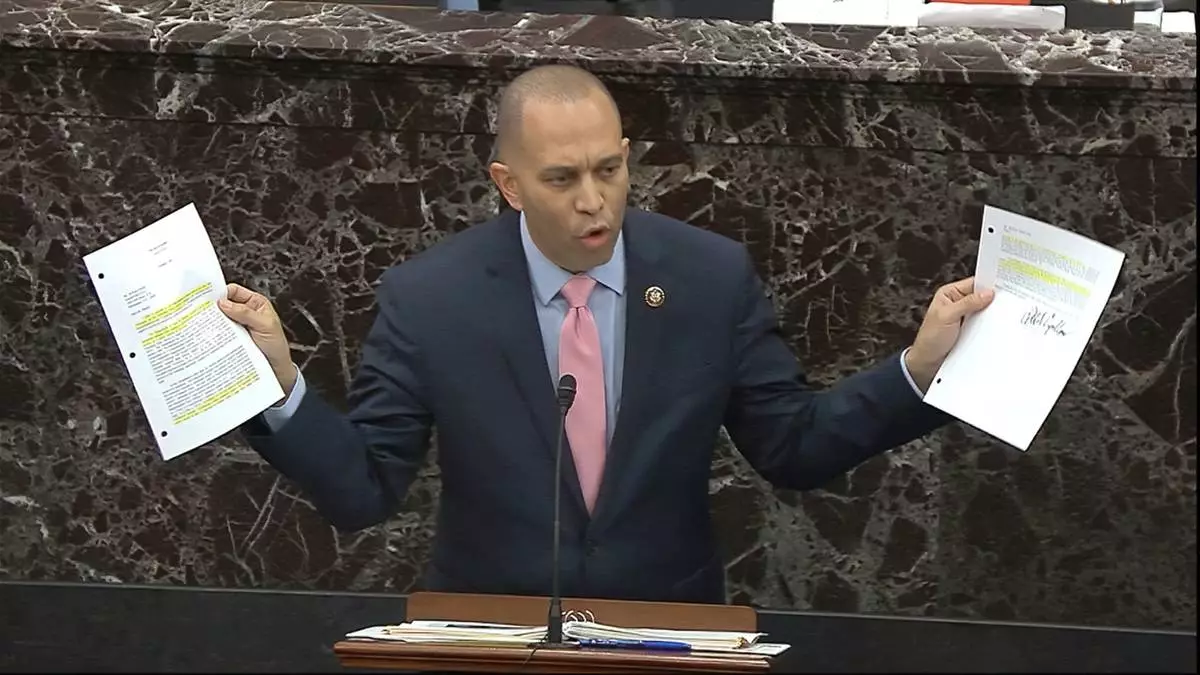
FILE - In this image from video, House impeachment manager Rep. Hakeem Jeffries, D-N.Y., answers a question during the impeachment trial against President Donald Trump in the Senate at the U.S. Capitol in Washington, Jan. 29, 2020. (Senate Television via AP, File)



















